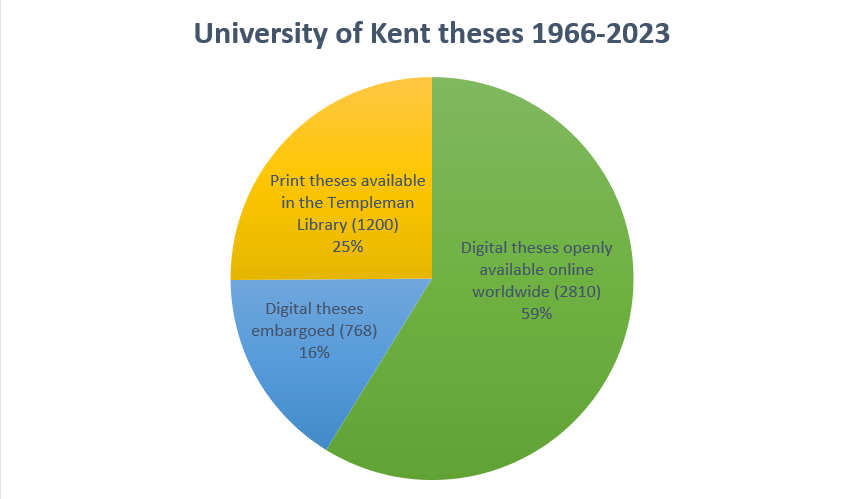75% of our thesis collection is now digital. This collection spans the University’s lifetime 1966-2023 and having a digital presence for theses that represent Kent’s research throughout this sixty years provides important evidence of our long-standing research culture. We have completed a project to digitise 600 theses from our collection of print theses and make them openly available. This latest achievement builds on previous digitisation projects and means that over half of our historic collection of print theses are now digitally preserved. Of our total 4778 theses, 2810 are now openly available worldwide.
What impact will this have?
- More of the university’s research output is discoverable online world-wide to be used, cited and built upon
- The university’s research longevity is now better demonstrated because our digitised theses span across 6 decades
- Our theses are in KAR, Ethos and ProQuest and appear highly ranked in the results of search engines such as Google and Google Scholar
- We are making the most of our existing unique collections by opening them up to the wider community, including our own staff and students via Library Search
- Use of our theses has increased with downloads from a diverse range of countries
- We are safeguarding part of our research collection through the digital preservation of irreplaceable items
- We have increased the opportunities for academic staff to use theses in their teaching because they can link to theses via the Reading List system and Moodle.
- We have increased the opportunities for students to use our theses in their learning and studies
Background
In 2019 2400 print theses were held in the basement of the library. They ranged from 1966 when the University first awarded PhDs to 2014. From 2014 the university’s theses have been uploaded to KAR in a digital format and so are available online.
In 2019 the IS Research and Scholarly Communications and Support Team began investigating the cost and feasibility of digitising our print theses collection. The majority of the university’s print theses could only be used on site. By digitising more of the collection we would make it available to the wider community and guarantee future preservation of our unique research collection. Usage of the online theses is high and we wanted to establish whether we could extend the same provision to the print collection.
Progress was delayed by Covid, but in 2022 we resumed the project and used Information Services library funds to send 600 print theses to the British Library to be digitised.
A further 600 of our print theses had already been digitised some years ago as part of a national BL project.
How we approached it
We employed an intern to scope the project. We used the following criteria to select titles for digitisation:
- a range across subject disciplines
- a range across each decade
- titles that had been most frequently requested from the library basement
- famous alumni
We took a sub-sample of these selected titles and attempted to contact the authors to establish the feasibility of communicating with all the authors. We established that it would not be practical to communicate directly with all the theses authors, because of the time it took to acquire contact information and the low volume of responses received.
Having consulted with other university libraries who have conducted similar projects, we adopted a risk-managed approach and are making the theses available online alongside additional information about the retrospective digitisation, contact details and our take-down policy.
What happened after digitisation?
By the end of March 2023 all the theses had been digitised.
The British Library added the bibliographic information for each title to EThOS and we imported this information into the KAR. We then worked through adding the pdfs of the theses to each entry.
Extra information was added to each KAR entry about its source and each theses was given a Creative Commons licence. A Creative Commons licence helps users to understand how the work can be re-used and shared, whilst protecting the rights of the creators.
Discoverability
As well as being in KAR and therefore discoverable in Google and other search engines, the theses are also in the British Library’s EThOS database and discoverable via the ProQuest Dissertations & Theses Global database.
Accessibility
The digitised theses have Optical Character Recognition (OCR) text which enables read aloud functionality of the text, which assists accessibility. We have added this information to the theses records in KAR. OCR also allows users to search the full text of a thesis to find particular sections of interest, or to move quickly to a specific part of the thesis. The average size of a thesis is around 330 pages. This means that OCR is a huge benefit to the user.
Increased use of our theses
We have compared usage statistics from KAR, EThOS and ProQuest for the last 3 years. Since March 2023, when the digitised theses records were added to KAR, there has been a marked increase in download figures from all three sites. The usage information shows that the digitisation exercise has really opened up our research outputs to the world, to countries as diverse as Tanzania, Belarus, Peru, Macau and Nepal. This Open Research is benefitting many users.
What next?
If and when funds are available in the future, we would love to consolidate this work and digitise the remaining collection, making best use of the processes and methodology we have developed.
Contact
Please contact researchsupport@kent.ac.uk with any queries

